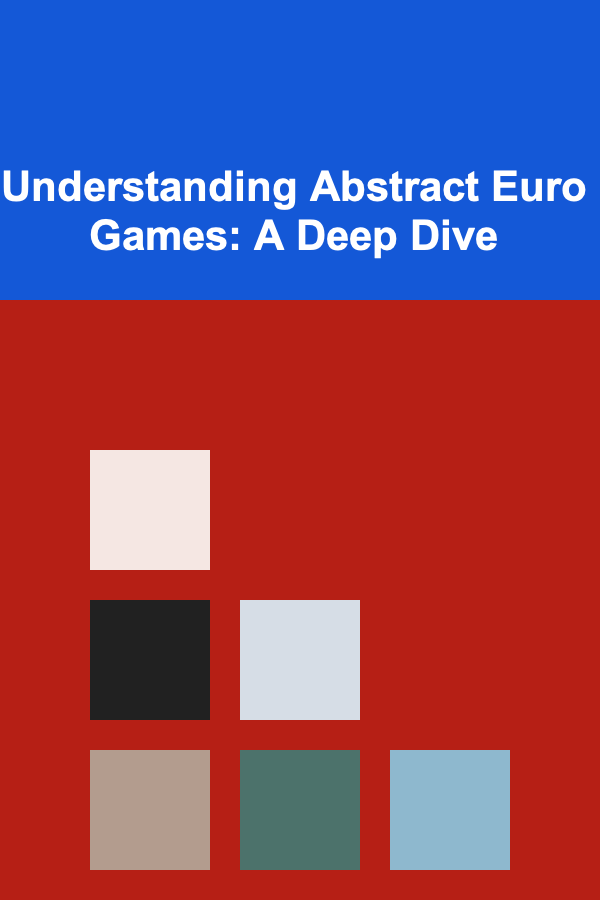
Understanding Abstract Euro Games: A Deep Dive
ebook include PDF & Audio bundle (Micro Guide)
$12.99$10.99
Limited Time Offer! Order within the next:

Abstract Euro games represent a fascinating, often challenging, and deeply rewarding corner of the board game hobby. Unlike their thematic counterparts, which immerse players in rich narratives and simulate real-world scenarios, abstract Euros prioritize pure strategic gameplay, stripping away layers of theme to expose the underlying mechanisms. This focus on mechanics can make them initially intimidating, but with a nuanced understanding of their core elements, design principles, and common strategies, players can unlock a world of intricate puzzles and satisfying strategic depth.
Defining the Abstract Euro Game: Beyond Theme
The term "abstract Euro game" is, in itself, a complex blend of two distinct concepts. "Eurogame" generally refers to a style of board game design originating in Europe, characterized by indirect conflict, resource management, engine building, and a focus on efficiency and optimization. They often feature point-salad scoring (multiple ways to earn points), limited player interaction (mostly indirect competition for resources or space), and a shorter playing time compared to their Ameritrash counterparts. "Abstract game," on the other hand, refers to games where the theme is either non-existent or purely ornamental, with the focus solely on the logical rules and the strategic decisions they engender. Classic examples of abstract games include Chess, Go, and Checkers.
When these two concepts merge, we get the Abstract Euro: a game with the mechanical underpinnings of a Eurogame -- resource management, optimization, and indirect conflict -- but stripped of any meaningful thematic overlay. This doesn't necessarily mean a complete absence of visuals; many abstract Euros feature beautiful artwork and components. However, the artwork typically serves to enhance the visual appeal of the game and clarify the mechanics rather than to create a sense of immersion or narrative.
Key characteristics of an Abstract Euro game typically include:
- Minimal or Non-Existent Theme: The game's mechanics operate independently of any real-world context. The narrative, if present at all, is largely irrelevant to the gameplay. For example, a game might feature colored cubes representing resources, but their specific nature (wood, metal, spices) is unimportant to the actual gameplay.
- Focus on Strategic Depth: The game's complexity arises from the interplay of its rules and the strategic choices available to players, rather than from thematic simulation. The challenge lies in understanding the system and making optimal decisions to maximize points or achieve a specific goal.
- Indirect Player Interaction: While direct conflict is rare, players often compete for limited resources, advantageous board positions, or scoring opportunities. This competition creates tension and forces players to anticipate each other's moves.
- Mathematical and Logical Elements: Many abstract Euros involve elements of spatial reasoning, combinatorial analysis, and pattern recognition. Players must often calculate probabilities, evaluate trade-offs, and plan several moves ahead.
- Clear and Concise Rules: Although strategically complex, abstract Euros tend to have relatively straightforward rules sets. The challenge lies in mastering the implications of those rules, not in deciphering them.
- Engine Building and Optimization: Players often develop their abilities over the course of the game. Building an "engine" refers to creating a system of interconnected actions that generate resources, points, or other advantages. Optimizing this engine is crucial for success.
- Point Salad Scoring: Winning often involves accumulating points in a variety of ways, forcing players to make strategic decisions about where to focus their efforts. This "point salad" approach adds another layer of complexity to the strategic landscape.
Why Play Abstract Euro Games? The Appeal of Pure Strategy
Despite their seemingly sterile nature, abstract Euro games offer a unique and compelling gaming experience. Their appeal stems from several key factors:
- Strategic Purity: Without the distraction of theme, players can focus entirely on the strategic and tactical elements of the game. This allows for a deeper understanding of the underlying mechanics and a more nuanced appreciation of the strategic possibilities.
- Mental Exercise: Abstract Euros provide a stimulating mental workout, challenging players to think critically, plan ahead, and adapt to changing circumstances. They are excellent for developing problem-solving skills and improving cognitive function.
- Elegance and Efficiency: The best abstract Euros are characterized by their elegant design, where a small number of rules generate a rich and complex strategic landscape. They are often models of efficiency, providing a deep and satisfying gaming experience in a relatively short amount of time.
- Replayability: The absence of a pre-determined narrative or thematic constraints allows for a high degree of replayability. The strategic possibilities are often vast, and each game presents a unique set of challenges and opportunities.
- Fairness and Skill: Abstract Euros tend to be highly skill-based, with minimal randomness or luck. This creates a level playing field where strategic acumen and tactical flexibility are the primary determinants of success. While some might find this intimidating, others appreciate the purity of a game where skill reigns supreme.
- Accessibility (Sometimes): While the strategy can be complex, the rules are often simple. This makes them relatively easy to teach and learn, even for players who are new to the genre. However, mastering the game requires significant effort and practice.
Deconstructing the Mechanisms: Common Elements in Abstract Euros
To truly understand abstract Euro games, it's essential to delve into the specific mechanisms that drive their gameplay. While the specific combinations and implementations vary widely, several common elements frequently appear:
1. Tile Placement and Spatial Reasoning
Many abstract Euros involve placing tiles on a central board to create patterns, claim territories, or connect specific elements. These games require strong spatial reasoning skills, as players must visualize the consequences of their actions and anticipate their opponents' moves. Examples include:
- Carcassonne: While arguably thematic, the core mechanic of tile placement to create roads, cities, and monasteries is fundamentally abstract. Players strategically place tiles to score points and block their opponents.
- Kingdomino: Players select domino-shaped tiles and add them to their personal kingdom, aiming to create contiguous areas of the same terrain to score points. The tile selection and spatial arrangement are purely abstract puzzles.
- Azul: Players draft colored tiles from factories and place them on their personal boards, aiming to complete rows and columns. The scoring system rewards strategic placement and penalizes wasted tiles.
- Project L: Players assemble Tetris-like pieces to complete puzzles that provide them with more pieces, snowballing their abilities into a high-scoring end game.
2. Resource Management and Conversion
A hallmark of Eurogame design, resource management involves acquiring, converting, and spending resources to achieve specific goals. In abstract Euros, these resources are often represented by colored cubes, tokens, or abstract symbols, devoid of any thematic significance. Examples include:
- Splendor: Players collect gems (represented by colored chips) and use them to purchase development cards, which provide victory points and reduce the cost of future purchases. The game revolves around optimizing resource acquisition and building a powerful engine.
- Century: Spice Road: Players collect and trade spices to fulfill contracts, earning victory points. The game focuses on optimizing the flow of resources and developing efficient trading routes.
- Brass: Lancashire & Birmingham: Players invest in industries, build canals and railroads, and manage their income to develop their industrial empires. While having a thematic veneer, the underlying mechanics are deeply rooted in resource conversion and economic efficiency.
3. Engine Building and Optimization
Engine building is the process of creating a system of interconnected actions that generate resources, points, or other advantages. Optimizing this engine is crucial for success in many abstract Euros. Players must carefully plan their actions to maximize efficiency and create a self-sustaining loop. Examples include:
- Terraforming Mars: Players invest in projects to increase the temperature, oxygen level, and ocean coverage of Mars, earning victory points for their contributions. Building a powerful engine that generates resources and triggers synergistic effects is essential for winning.
- Res Arcana: Players control mages who use essences to craft artifacts, summon dragons, and claim places of power. The game emphasizes engine building and optimizing the flow of resources to generate victory points.
- Gizmos: Players build a machine that triggers chain reactions, converting energy spheres into victory points. The game is a pure engine-building exercise, with players striving to create the most efficient and powerful machine possible.
4. Set Collection and Pattern Recognition
Some abstract Euros reward players for collecting specific sets of items or recognizing patterns on the board. These games often involve elements of probability and risk assessment, as players must weigh the potential rewards of pursuing a particular set against the risk of wasting resources. Examples include:
- Ticket to Ride: Players collect colored train cars and use them to claim routes between cities, earning points for completing destination tickets. The game involves a mix of set collection, route planning, and risk management.
- Qwirkle: Players place tiles with matching attributes (color or shape) to create lines, earning points for each tile placed. The game requires pattern recognition and strategic placement to maximize scoring opportunities.
- Sagrada: Players draft colored dice and place them on their personal stained-glass windows, adhering to specific placement restrictions. The game involves set collection, pattern recognition, and strategic drafting.
5. Area Control and Influence
While direct conflict is rare, many abstract Euros involve area control or influence, where players compete to dominate specific regions or control key resources. These games often require careful planning and strategic positioning to outmaneuver opponents and secure valuable territories. Examples include:
- El Grande: Players secretly allocate caballeros (wooden figures) to different regions of Spain, competing for control of those regions and earning points for their influence. The game involves a blend of area control, bidding, and hidden movement.
- Tigris & Euphrates: Players place leaders and monuments on the board to establish civilizations, competing for influence in different areas and earning points for their achievements. The game involves a complex interplay of area control, resource management, and strategic maneuvering.
- Go: A classic example of abstract area control. Players place stones on a grid to surround territory and capture opponent's stones.
6. Auction and Bidding
Auctions and bidding are common mechanisms in Eurogames, and they can be found in some abstract Euros as well. They introduce an element of strategic risk assessment, as players must carefully weigh the value of an item against their willingness to pay for it. Examples include:
- Ra: Players bid on tiles using sun tokens, aiming to collect sets of valuable items and score points. The game involves a unique auction mechanism where players can end the round prematurely, potentially denying their opponents valuable opportunities.
- Modern Art: Players auction off paintings, attempting to manipulate the art market and profit from their investments. The game involves a blend of auctioning, set collection, and market manipulation.
Strategies for Mastering Abstract Euro Games
Understanding the core mechanisms of abstract Euros is only the first step. To truly master these games, players must develop a range of strategic skills and tactical approaches. Here are some key strategies to consider:
1. Analyze the Board State and Identify Opportunities
Before making any move, take the time to carefully analyze the current board state. Identify potential scoring opportunities, assess the position of your opponents, and anticipate their likely moves. Look for patterns, connections, and synergies that can be exploited to your advantage. Don't just react to the immediate situation; think several steps ahead.
2. Plan Your Engine and Optimize Your Actions
In engine-building games, focus on developing a system of interconnected actions that generate resources, points, or other advantages. Prioritize actions that contribute to the overall efficiency of your engine, and avoid wasting resources on activities that provide minimal returns. Experiment with different engine configurations to find the optimal balance between resource generation and scoring potential.
3. Adapt to Changing Circumstances
No plan survives contact with the enemy. Be prepared to adjust your strategy in response to changing circumstances. Monitor your opponents' moves, anticipate their actions, and adapt your approach accordingly. Don't be afraid to abandon a failing strategy and pursue a new one if necessary. Flexibility and adaptability are essential for success in abstract Euros.
4. Manage Your Resources Effectively
Resource management is a crucial skill in many abstract Euros. Learn to prioritize your resource acquisition, conversion, and spending. Avoid wasting resources on unnecessary purchases or actions. Focus on acquiring resources that are essential for your strategic goals, and convert them into points or other advantages as efficiently as possible.
5. Control Key Areas and Deny Opponents Opportunities
In area control games, focus on securing key territories and denying your opponents valuable opportunities. Position your pieces strategically to maximize your influence and minimize your opponents' influence. Anticipate their moves and block their attempts to gain control of important areas. Don't be afraid to sacrifice a smaller area to secure a more valuable one.
6. Understand the Scoring System and Maximize Your Points
Pay close attention to the scoring system and identify the most efficient ways to accumulate points. Focus on actions that provide the highest point yield, and avoid wasting resources on activities that provide minimal returns. Don't neglect any potential scoring opportunities, and be prepared to adjust your strategy to maximize your point total.
7. Read Your Opponents and Anticipate Their Moves
While direct communication may be limited, you can still glean valuable information from your opponents' actions. Pay attention to their resource acquisition, their tile placements, and their strategic priorities. Try to anticipate their likely moves and develop countermeasures to thwart their plans. Understanding your opponents' strategies is crucial for outmaneuvering them and achieving victory.
8. Practice, Practice, Practice!
Like any skill, mastering abstract Euro games requires practice. Play the games repeatedly, experiment with different strategies, and analyze your mistakes. The more you play, the better you'll understand the nuances of the game and the more effectively you'll be able to apply these strategies.
Examples of Excellent Abstract Euro Games
Here are a few highly-regarded examples of abstract Euro games, representing a range of complexity and strategic styles:
- Azul: (Tile Placement, Set Collection) A beautiful and accessible game of tile drafting and pattern building.
- Splendor: (Resource Management, Engine Building) A fast-paced and elegant game of gem collection and card purchasing.
- Kingdomino: (Tile Placement) A simple but surprisingly strategic game of domino placement and territory building.
- Through the Desert: (Route Building, Area Control) A classic Knizia game where players lead caravans across the desert, claiming oases and watering holes.
- Yinsh: (Abstract Strategy, Pattern Recognition) A two-player game of skill and strategy where players attempt to create lines of five matching pieces.
- TZAAR: (Abstract Strategy, Piece Movement) The second game in the GIPF Project. A 2-player abstract strategy game that's a modern classic.
Conclusion: Embracing the Strategic Challenge
Abstract Euro games offer a unique and rewarding gaming experience for players who appreciate pure strategic gameplay. By understanding their core elements, design principles, and common strategies, players can unlock a world of intricate puzzles and satisfying strategic depth. While they may seem intimidating at first, the challenge of mastering these games is ultimately what makes them so compelling. So, embrace the strategic challenge, delve into the world of abstract Euros, and discover the joy of pure, unadulterated gameplay.

How to Choose the Best Paint Colors for Your Home Renovation
Read More
How to Label Pantry Shelves for Quick Identification
Read More
How to Make Pet-Friendly DIY Projects for Your Home
Read More
How to Use Color and Light to Enhance Small Areas
Read More
Mastering the Role of Account Executive: Advanced Strategies for Sales Success
Read More
How to Build a Gourmet Food Gift Box That Impresses
Read MoreOther Products

How to Choose the Best Paint Colors for Your Home Renovation
Read More
How to Label Pantry Shelves for Quick Identification
Read More
How to Make Pet-Friendly DIY Projects for Your Home
Read More
How to Use Color and Light to Enhance Small Areas
Read More
Mastering the Role of Account Executive: Advanced Strategies for Sales Success
Read More